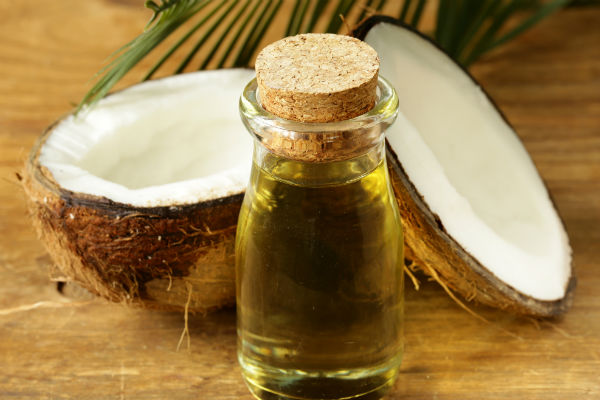I Feed My Dog a Little Bit of Coconut Oil Everynight Can That Cause His Nose to Be Real Dry
Coconut oil has become a popular supplement for humans. It's thought to have benefits like boosting the immune system, aiding in weight loss, working as an anti-inflammatory and anti-fungal, and improving cognitive skills in patients with Alzheimer's. Used topically, coconut oil is an effective moisturizer and lip balm. But pet owners are asking: Is coconut oil beneficial to dogs? The answer is a qualified "yes." Some holistic and naturopathic veterinarians believe that coconut oil has qualities that can aid in many types of canine conditions.
The Science Behind Coconut Oil
Coconut oil comes from the meat of coconuts harvested from the coconut palm. Coconut oil consists of at least 90% saturated fats, most of which are Medium Chain Triglycerides (MCTs). Although we're used to thinking of fats as bad for us, MCTs are "good" fat and can provide several benefits, including being a source of fuel and energy. The components of MCTs include lauric acid, which is antibacterial, anti-fungal and anti-viral; capric acid and caprylic acid, which are known for their anti-fungal effects; and other acids that are polyunsaturated and monounsaturated fatty acids. According to Dogs Naturally Magazine, MCTs are quickly metabolized to provide energy. For a more in-depth explanation of the components of coconut oil, take a look at the presentation from the Pennington Biomedical Research Center at Louisiana State University.
What Are the Benefits of Coconut Oil for Dogs?

- Lauric Acid – We've already mentioned the anti-inflammatory, anti-fungal and anti-bacterial properties of coconut oil. The lauric acid is also supposed to fight off viruses.
- Medium Chain Triglycerides – Some vets believe that the MCTs in coconut oil aid in digestion and can help heal digestive disorders, as well as improve brain energy and mental function in older dogs.
- Reduces coughing and helps eliminate hairballs.
- Topical Benefits – It's been known to help skin conditions like hot spots, bites, stings, or itchy, dry skin. Shampoos made with organic oils such as coconut oil can improve damaged skin and reduce allergens. Some pet owners have even made a DIY paw balm with coconut oil as one of the ingredients.
- Makes dogs' coats glossy and sleek.
- Eliminates doggy odor.
- Benefits metabolic function, weight loss, arthritis and bone health.
But, and this is a big "but," there is skepticism among scientists and veterinarians about all of these claims. According to Dr. Kathy Boehme at the Drake Center for Veterinary Care in California, while coconut oil has beneficial topical uses, it's not the cure-all some believe it is. Before you make the decision to use it for whatever ails your dog, talk to your vet and take into account that there have been no credible studies proving that coconut oil aids in thyroid dysfunction, weight loss, gum and teeth diseases, or cancer prevention.
Additionally, coconut oil doesn't provide the daily fat requirements your dog needs. The acids in MCTs don't have enough omega-6 and omega-3 acids, and what it does contain isn't processed very efficiently. As for claims that MCTs protect against bacteria, viruses, and fungi, while the lauric acid in MCTs does kill germs in lab tests, there is no clear evidence that it can be used in great enough quantities to offer dogs much protection.
However, given that so many pet owners are wary of the overuse of pharmaceutical antibiotics and anti-fungals, you and your vet may decide it's worth trying this natural and holistic approach.
How Do I Use Coconut Oils for My Dog?
If you plan to give coconut oil to your dog orally, you must start with small amounts and build up the dosage gradually. You should consult with your veterinarian regarding dosage. There can be side effects, such as greasy stools or diarrhea, which usually happens if the dose is too large.
To use coconut oil topically, apply it to the skin about once a week, and let it be absorbed for a few minutes. After five minutes or so, rinse your dog off. If he still feels excessively greasy or oily, you can follow up with a light shampoo and rinse. Alternatively, use a shampoo made with organic coconut oil.
Again, consult your veterinarian. If your dog has a tendency to gain weight, has pancreatitis, or he metabolizes fat inefficiently, you're better off using coconut oil topically or in very small doses.
How Do I Choose a Coconut Oil for My Dog?

Choose unrefined coconut oil, also called virgin coconut oil. Better yet, look for cold-pressed oil, which uses a method to process the oil quickly after the coconuts are harvested to preserve nutrients. If you're feeding it to your dog, be aware that different oils have different smells and tastes. Some have a bold coconut taste, while others are bland. Some are buttery and smooth, while others are nutty. You may have to experiment a bit to find one your dog likes.
There's no doubt that we all want to take care of our dogs as safely, effectively, and naturally as possible. Coconut oil may be the next great thing, but it's wise to take into account the healthy skepticism that surrounds it. You and your veterinarian can make the decision whether coconut oil is a beneficial supplement to your dog's life.
Source: https://www.akc.org/expert-advice/health/is-coconut-oil-good-for-dogs/
Post a Comment for "I Feed My Dog a Little Bit of Coconut Oil Everynight Can That Cause His Nose to Be Real Dry"